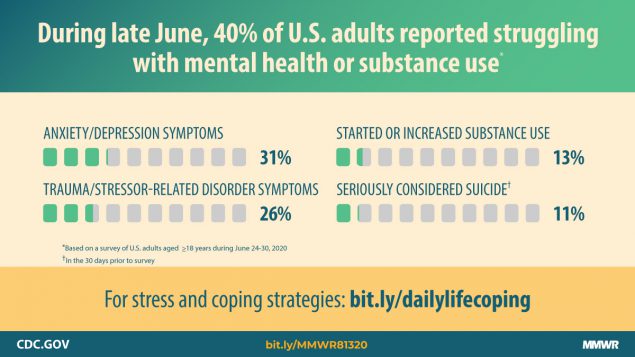By the Numbers: 14 September 2020
53%
The percentage of U.S. adults who "reported that their mental health has been negatively impacted due to worry and stress over the coronavirus," according to a new report from the Kaiser Family Foundation (KFF) -- The Implications of COVID-19 for Mental Health and Substance Use. "This is significantly higher than the 32% reported in March, the first time this question was included in KFF polling."
Many adults are also reporting specific negative impacts on their mental health and wellbeing, such as difficulty sleeping (36%) or eating (32%), increases in alcohol consumption or substance use (12%), and worsening chronic conditions (12%), due to worry and stress over the coronavirus. As the pandemic wears on, ongoing and necessary public health measures expose many people to experiencing situations linked to poor mental health outcomes, such as isolation and job loss.
An article appearing recently in the Center for Disease Control and Prevention publication, Morbidity and Mortality Weekly Report, included similar findings. According to the article -- Mental Health, Substance Use, and Suicidal Ideation During the COVID-19 Pandemic — United States, June 24–30, 2020:
Overall, 40.9% of respondents reported at least one adverse mental or behavioral health condition, including symptoms of anxiety disorder or depressive disorder (30.9%), symptoms of a trauma-and stressor-related disorder (TSRD) related to the pandemic† (26.3%), and having started or increased substance use to cope with stress or emotions related to COVID-19 (13.3%). The percentage of respondents who reported having seriously considered suicide in the 30 days before completing the survey (10.7%) was significantly higher among respondents aged 18–24 years (25.5%), minority racial/ethnic groups (Hispanic respondents [18.6%], non-Hispanic black [black] respondents [15.1%]), self-reported unpaid caregivers for adults (30.7%), and essential workers (21.7%).
53%
The percentage of U.S. adults who "reported that their mental health has been negatively impacted due to worry and stress over the coronavirus," according to a new report from the Kaiser Family Foundation (KFF) -- The Implications of COVID-19 for Mental Health and Substance Use. "This is significantly higher than the 32% reported in March, the first time this question was included in KFF polling."
Many adults are also reporting specific negative impacts on their mental health and wellbeing, such as difficulty sleeping (36%) or eating (32%), increases in alcohol consumption or substance use (12%), and worsening chronic conditions (12%), due to worry and stress over the coronavirus. As the pandemic wears on, ongoing and necessary public health measures expose many people to experiencing situations linked to poor mental health outcomes, such as isolation and job loss.
An article appearing recently in the Center for Disease Control and Prevention publication, Morbidity and Mortality Weekly Report, included similar findings. According to the article -- Mental Health, Substance Use, and Suicidal Ideation During the COVID-19 Pandemic — United States, June 24–30, 2020:
Overall, 40.9% of respondents reported at least one adverse mental or behavioral health condition, including symptoms of anxiety disorder or depressive disorder (30.9%), symptoms of a trauma-and stressor-related disorder (TSRD) related to the pandemic† (26.3%), and having started or increased substance use to cope with stress or emotions related to COVID-19 (13.3%). The percentage of respondents who reported having seriously considered suicide in the 30 days before completing the survey (10.7%) was significantly higher among respondents aged 18–24 years (25.5%), minority racial/ethnic groups (Hispanic respondents [18.6%], non-Hispanic black [black] respondents [15.1%]), self-reported unpaid caregivers for adults (30.7%), and essential workers (21.7%).

